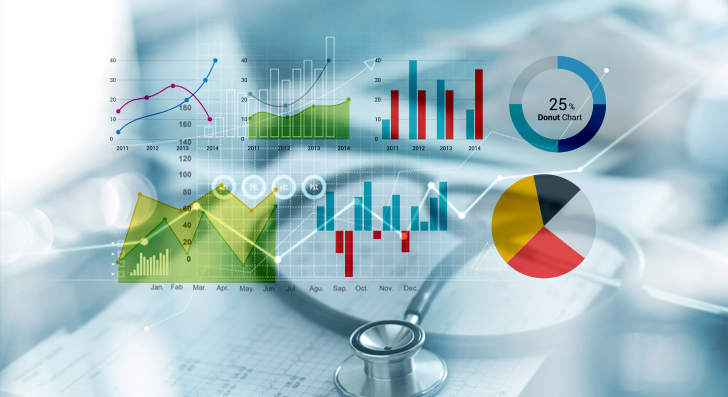The global digital healthcare market attained a valuation of USD 330 billion in 2022. This figure is expected to touch USD 650 billion by 2025 – a remarkable leap indicating the exponential growth of the sector. The winds of digitization are putting data at the forefront of all operations. From personalizing the patient’s experience to making healthcare preventive – data finds itself at the heart of all activities.
However, data collection, organization, and management in healthcare, especially in the age of big data, is no easy feat. The vast amounts of data scattered across siloes and in unstructured and unorganized formats can easily get overwhelming. Such fragmented data distorts the singular view of the patient, hinders research and development, and limits the effectiveness of digital healthcare. Further, concerns surrounding data privacy and security pose additional hurdles in working with personal information.

Given these challenges, data mining in healthcare appears to be a ray of hope. It leverages advanced and sophisticated algorithms to make data more workable and detect trends and patterns. These insights unlock the true potential of data in healthcare.
Here’s a deep dive into how businesses can leverage data mining in the healthcare industry and improve outcomes for their target customers – patients and healthcare providers.
Demystifying Data Mining: How Data Mining Works in Healthcare?
Data mining is the process of sifting through large datasets to discover hidden patterns and relationships. This unlocks a new plane of insights that might otherwise go untapped with basic data analytics.
Think of healthcare data as a large warehouse containing medical records, patient diagnoses, test results, treatment plans, genomic data, and more. Data mining in the healthcare industry is akin to a team of highly skilled investigators that leverage high-end algorithms to comb through this information to extract actionable insights.
Such an in-depth analysis reveals:
- Trends and patterns in disease progression, which allow healthcare providers to intervene during the early stages to improve treatment efficacy and patient outcomes.
- Opportunities for early disease detection and prevention by correlating patient profiles with associated risk factors to compute the possibility of developing certain illnesses.
- Effectiveness of treatment in certain patient groups to understand which treatments are most effective and appropriate for certain patient demographics.
- Potentially harmful drug interactions to prevent adverse drug reactions and to improve patient safety and well-being.
- Trends in resource utilization, patient admissions, etc. for effective resource optimization for continued care.
Applications of Data Mining in Healthcare: A Cure for Many Ailments
From personalizing patient care to detecting fraud in health insurance claims, data mining can comfortably fit across various healthcare or allied activities. To illustrate this point, here are some common data mining applications in healthcare:
1. Personalized Medicine: Data mining in healthcare analyzes patient data such as their medical history, genetic makeup, lifestyle, etc. to tailor treatment plans. By aligning treatment with individual needs, healthcare institutions can deliver more effective care with improved patient outcomes.
2. Preventive Care: Data mining operations can leverage predictive analytics to identify the likelihood of an individual developing certain diseases. Such foresight allows for early intervention and preventive care that mitigates the impact of illnesses, if not wards it off entirely.
3. Chronic Disease Management: When it comes to chronic disease management, data mining helps in monitoring health levels and predicting complications, if any. Such a proactive and vigilant approach to care prevents complications or hospitalization while reducing the burden on healthcare infrastructure.
4. Clinical Research and Drug Discovery: Researchers can leverage data mining to pore over vast data reserves of medical records, studies, clinical trials, and other bodies of research. This helps them identify promising areas of R&D while developing new drugs or treatment plans.
5. Hospitalization Management: Data mining helps identify patients at risk of hospitalization and readmissions. These can be prevented through early-stage intervention or continued care to lower overall healthcare costs.
6. Mass Healthcare: By analyzing data on population health, establishments can identify trends surrounding pandemics, disease prevalence, risk factors, etc. This information will be useful in developing targeted public healthcare programs and initiatives to support and improve population health.
7. Remote Patient Monitoring: All the data collected from smart wearable devices and other remote monitoring tools can widen the scope of data mining in healthcare. Such accessibility to first-party data allows healthcare providers to track health in real time and execute interventions in case of any concerns.
See How Data Mining Is Revolutionizing Industries
Advantages of Data Mining in Healthcare: A Multifaceted, Data-Driven Approach to Treatment and Care
Here’s an overview of the benefits of data mining in healthcare:
I. Enhanced patient care through targeted treatment delivery, personalized medicine, enhanced disease prevention, early detection and intervention, etc., for better patient outcomes.
II. Optimized resource allocation and utilization in healthcare establishments based on trends in-patient admissions and other medical care-related activities.
III. Reduced healthcare costs through early disease detection, preventive care, and optimized resource allocation.
IV. Advanced research and development of innovative drugs and treatment plans. Researchers can use it to identify promising areas of healthcare.
V. More effective patient care and data-driven decision-making for informed diagnoses, treatment plans, and patient care.
VI. Protection from fraud and abuse, and corresponding financial losses, by flagging anomalous patterns.
Challenges of Data Mining in Healthcare: Possible Roadblocks with Solutions
While the applications and advantages of data mining in healthcare are attractive, it is not immune to obstacles either. Here are some challenges of data mining in healthcare, along with possible solutions:
a. Data Quality and Standardization: The vast amounts of healthcare data spread across systems, organizations, and departments can render it siloed, obsolete, inconsistent, and riddled with errors. Institutions can combat it by implementing data quality standards and enforcing stringent data governance practices that ensure consistency and accuracy.
b. Data Privacy and Security: Medical and healthcare data is highly personal, making data privacy and security paramount. Even the smallest of data breaches can have catastrophic effects. To mitigate this, institutions must avail data mining services that employ robust data security measures like anonymization and encryption to mask sensitive information. At the same time, prioritizing patient consent and maintaining transparency regarding data collection and use will also cultivate trust.
c. Algorithmic Bias: Data mining can perpetuate and reinforce biases existing in healthcare data. This could result in inaccurate and unfair results. In some cases, it might gloss over an entire demographic that is often underrepresented in healthcare data. To prevent this, develop and utilize diverse training datasets to restrict bias. Pair this with human oversight in decision-making. Conduct regular audits and update algorithms to ensure fairness.
d. System localization: Healthcare organizations often employ proprietary systems. Such digital ecosystems limit interoperability, hinder collaboration, and restrict data sharing. Investing in interoperable data platforms that facilitate data exchanges while maintaining security can be useful in the long run. If not for a system overhaul, integrations can also help in setting up comprehensive networks.
Building a Future of Healthcare Based on Data-Driven Insights
Data mining is a powerful tool possessing the potential to revolutionize healthcare. It makes healthcare data-driven to improve patient outcomes in multivariate ways while also managing the load on healthcare institutions. However, to extract the benefits of data mining in healthcare, institutions have to address concerns surrounding data quality, privacy, algorithmic bias, and system localization.
To sum up, data mining is a step towards making healthcare healthier!





